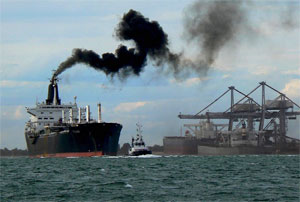Questions about adequate supplies and quality of low-sulfur bunker fuel continue to loom as the maritime industry prepares for the transition to 0.5 percent fuel on Jan. 1, 2020.
Faced with potential shortages or quality issues regarding low-sulfur fuel, shipowners can use fuel with higher sulfur content by filing a fuel oil non-availability report (FONAR). However, the International Chamber of Shipping (ICS) has warned shipowners that a FONAR is not a “free pass” to use or carry less expensive fuels with higher sulfur content.
“FONARs remain a tool of last resort and are not something that a ship will be able to use routinely,” said Simon Bennett, deputy secretary-general of the ICS. “The circumstances in which a FONAR can be used are very limited, and conditions attached to their use will be strict. Shipowners still need to remain focused on doing everything possible to ensure full compliance in 2020.”
The ICS anticipates that shipowners may encounter quality or compatibility problems with new 0.5 percent blended fuels in some areas of the world. However, higher cost alone will not be considered a valid reason to use cheaper noncompliant fuels. The ICS warned that only the minimum possible quantity of noncompliant fuel should be bunkered if a FONAR is issued, as it is likely that any remaining noncompliant fuel will be required by port state control to be debunkered at the next port of call, ruling out its use on subsequent voyages.
Port state authorities will review the FONAR and determine whether to detain the vessel, looking at the number of FONARs a ship has submitted in the past 12 months, the number the operator has submitted for other ships in its fleet, and whether other ships on similar voyages have submitted FONAR reports.
Cost estimates for low-sulfur fuel range from 25 to 40 percent more than standard bunker fuel, which runs around $440 per metric ton.
Concerns about the supply of low-sulfur fuel are easing, as major refiners such as BP PLC, Royal Dutch Shell PLC and Exxon Mobil Corp. expect to have ample supplies at major ports, according to industry reports. Fuel traders in Singapore have been stockpiling components in very large crude carriers.
Fuel quality problems likely related to blending have reportedly rendered power plants of vessels operating in the Gulf of Mexico inoperative, and detailed chemical analysis has found contamination of certain substances that could cause serious problems. The International Bunker Industry Association recommends that shipowners document bunkering procedures and retain relevant fuel samples in case of problems.
Members of the Chamber of Shipping of America have reported fuel quality issues, according to Kathy Metcalf, president and chief executive officer. She expects that as IMO 2020 takes effect, there may be quality problems as refineries work to find the optimal blends. Fuel contamination problems also have been identified in Singapore, Panama and the Dutch Antilles.
In the case of the 0.1 percent fuel used in the North American and Caribbean Emissions Control Areas (ECAs), there were fuel blends out of specification that were not discovered until the fuel was tested after loading. In the past, the U.S. Coast Guard has been lenient with shipowners who self-report fuel that does not meet sulfur specifications if the information on the fuel delivery notice was found to be incorrect after testing. In the past, these shipowners have not filed a FONAR but communicated directly with the Coast Guard, Metcalf said.
Each port state will be responsible for determining its own enforcement policies and penalties, which will vary in each jurisdiction. The Coast Guard has indicated that its existing Annex VI regulatory and enforcement framework will remain in force.

